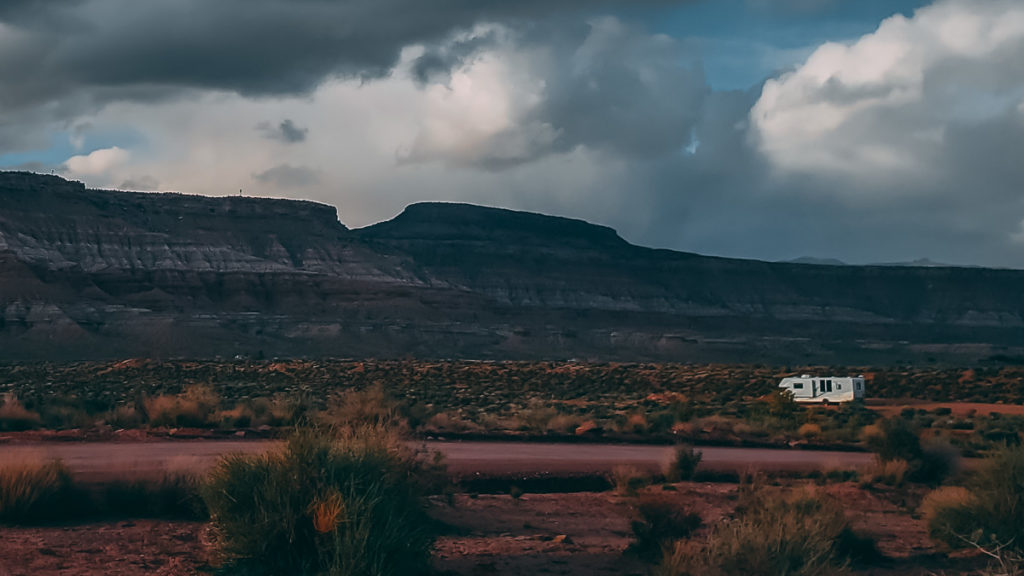Yes, it is. It is totally legal to leave your RV unattended while boondocking on all federally managed lands, and even most state managed lands. But for how long can you leave a motorhome, camper, or trailer by itself on public lands? That depends on the agency managing the land are you on…

Is it Legal to Leave Your RV Unattended While Boondocking?
All federal land management agencies have regulations in place dictating how long you can leave your RV unattended, or they address the matter in terms of abandoning personal property. They also have regulations against leaving personal property in place for the purpose of reserving a campsite for a future visit…
Bureau of Land Management
- Boondocking on Open Land – The BLM limits the amount of you time you can leave your personal belongings unattended to no more than 10 days, or 12 months if in Alaska. (Reference, § 8365.1-2 Occupancy and use)
- Camping within a Developed Recreation Area – The BLM limits the amount of time you can leave your personal belongings unattended to no more than 24 hours in a day use area, or 72 hours in other areas. (Reference, § 8365.2-3 Occupancy and use…)
U.S. Forest Service
The USFS only requires that you do not abandon any personal belongings (Reference, § 261.10 Occupancy and use). Otherwise, it does not specify how long you can leave a vehicle, campsite, or other equipment, unattended. It’s assumed you can leave them unattended up to the camping limit of stay.
National Park Service
All parks and recreation areas managed by the National Park Service require RVs, motorhomes, campers, and other vehicles to be camped in marked campsites within designated campgrounds…
- The NPS has no rules specific to how long you can leave a vehicle unattended inside a campground. It is assumed it can remain unattended up the maximum camping stay.
- The NPS only has a rule against leaving personal property behind (like trash, broken items, or unwanted stuff) after you have vacated your stay. (Reference, § 2.10 Camping and food storage).
- With respect to backcountry camping, which is intended for hikers and tent campers only, there are no rules on how long you can leave your camping gear unattended. It’s up to each NPS property to make this determination.
Army Corps of Engineers
Most camping inside Army Corps of Engineers projects is limited to designated campgrounds. They do offer primitive camping in many of their campgrounds, however…
- The ACOE has a rule against placing personal property (including a vehicle or tent) on a campsite for the purpose of keeping that site reserved for a future visit. This rule was created because the ACOE has many popular campgrounds where people will tow a trailer out there a few days before the start of a holiday weekend, just to claim a campsite, and then go away until the weekend starts. (Reference, § 327.7 Camping).
- The ACOE has a rule against leaving personal property unattended for more than 24 hours. (Reference, § 327.15 Abandonment and impoundment of personal property). This rule was intended primarily for day-use areas, where after closing hours, any personal property left behind could be impounded. However, based on the way the rule is written, it also applies to any property left anywhere, as long as it has been unattended for 24 hours.
U.S. Bureau of Reclamation
The USBR primarily contracts with other government agencies (federal, state, or county) to manage its recreation areas, and in those cases the rules of those agencies apply. However, there are a handful of projects where the USBR manages recreation areas on its own. Only in this case do the following rules apply…
- The USBR has a rule against leaving personal property unattended for more than 24 hours. (Reference, § 423.23 Abandonment and impoundment of personal property). However, they generally only enforce this rule on personal property that impedes the flow of traffic or endangers other people.
- The USBR has a rule against leaving personal property unattended for the purpose of reserving that campsite for a future visit. (Reference, § 423.33 Camping).
U.S. Fish & Wildlife Service
Most National Wildlife Refuges in the United States do not allow camping of any kind, however there are a handful that do. Refer to, “Camping at National Wildlife Refuges” for a list.
- The USFWS has a rule against abandoning property at a national wildlife refuge. (Reference, § 27.93 Abandonment of property). However, the rule is worded in such a way as to be vague. That is, it does not define abandonment in terms of how much time has expired.
- Otherwise, it’s assumed that as long as you have a campsite established, and you have not exceeded your maximum length of stay, you can leave it unattended up to the maximum length of stay.
State Parks
Almost all state parks in the United States do not allow boondocking. Instead, camping is limited to developed campgrounds, or designated camping areas. The only state park we know of thus far that allows boondocking is Anza Borrego Desert State Park in California.
- Most state park campgrounds we’ve been to do not have rules addressing leaving your campsite unattended. They generally are only concerned about people abandoning personal property, including trash, behind after they have concluded their stay.
State Trust Lands
Of the 16 remaining states that still hold trust lands, none have any rules specific to leaving your vehicle, RV, or campsite unattended. States that allow camping on trust lands generally have few rules, most of which involves how long you can stay, and what kind of permit must be purchased…
- We have published all of the rules relating to camping on state trust lands, for all of the states that still permit camping. Refer to, “Camping on State Trust Lands“.

